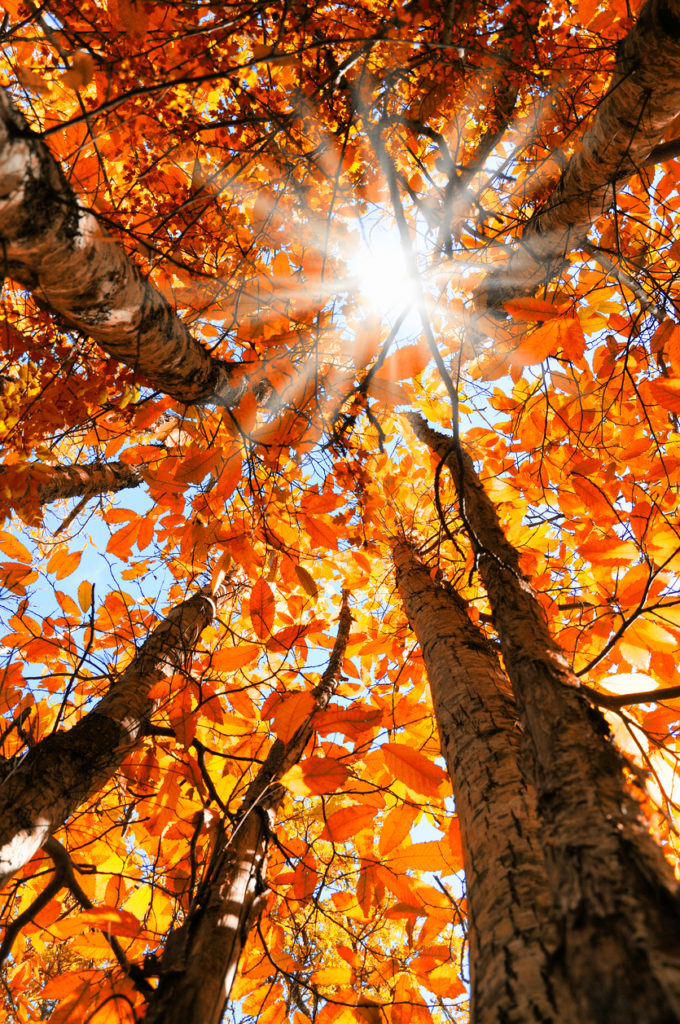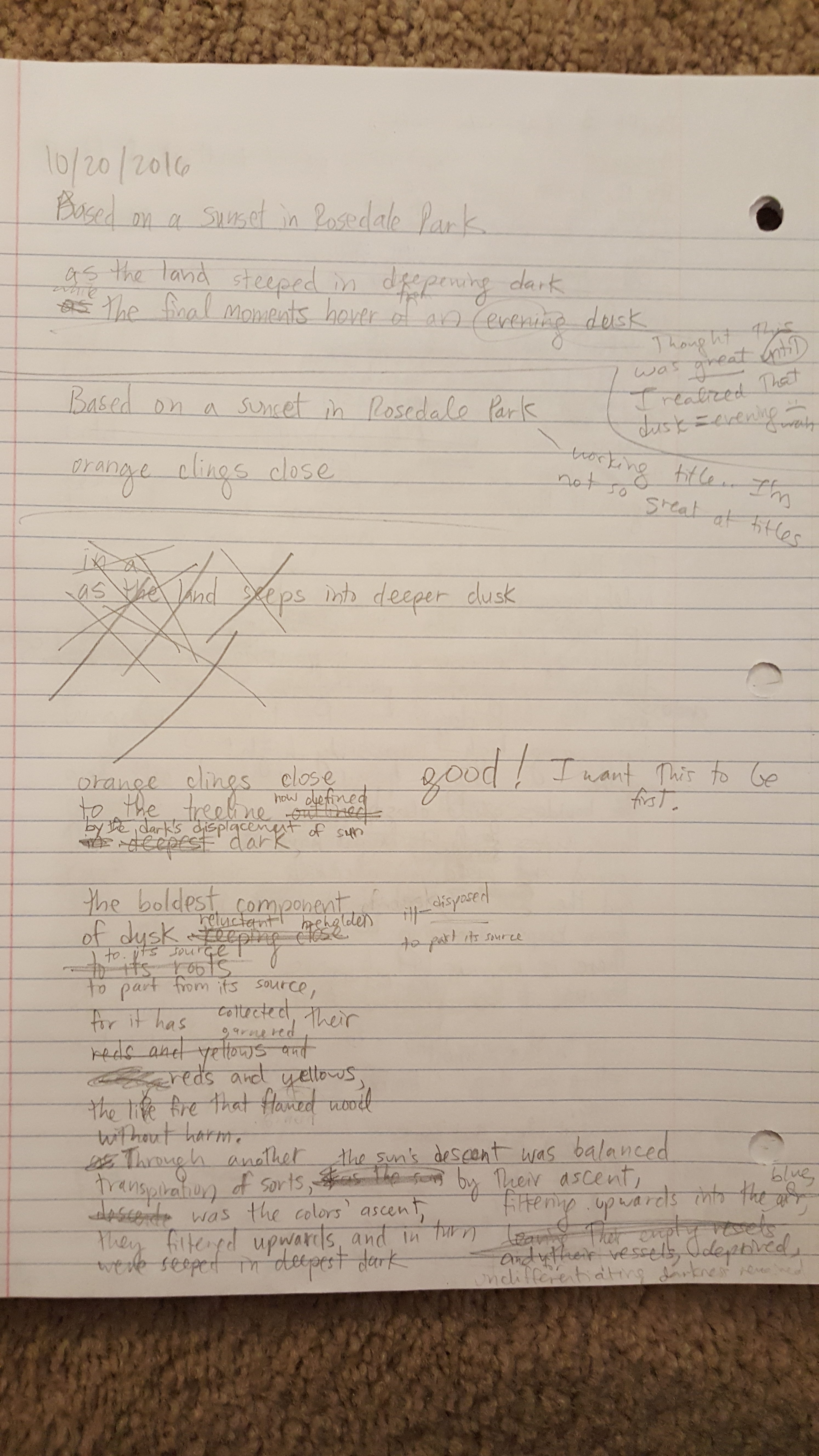
Rosedale Glow
Orange clings close
to the treeline defined
now only by lack;
dusk’s boldest member
loath to depart
its source.
For it has garnered
these trees’ reds,
their purples and golds,
the live fire lately posed
mid-peacock’s flare
on branches’ ends,
and left their containers
featureless silhouettes.
This spectrum’s ascent leveraged
out the sun’s dive,
as in a transpiration of light they
climbed, trickling out
of earthly bounds
to intersperse with airy blue.
So they keep close,
ill-disposed to quit familiar forms,
but at length all their reds mellow
peach, and all their hues
brim blue.
Then they inch out, extend
in finger-grasps to bridge
the breadth of sky,
for once they have made their goodbyes,
they will settle all corners
above slumbering earth,
and in the site of their wonder’s birth,
they wait, stored.
I wrote this poem midway through the semester, a few weeks after I had broken through what had seemed to be a poetry-specific mental barrier, and I was really happy with its eventual result (seven or eight drafts later). It is my favorite piece because it embodies the characteristics of the style I so value in my poetry-writing: vivid, lingering, and punctuated by few, potent words. A piece where every word counts. I remember that Poe said that about his short stories (which seems a slightly more difficult task to undertake), and it is something I heartily apply to poetry, and yet which I find such a challenge to actually carry out. In this poem, I really feel that – on the whole, since it could still be open to a few minor tweaks — I have managed to do so.
The inspiration for this poem came when I was running at nearby Rosedale Park. I was actually still on the trail until way too late — I had forgotten that, in early October, it was beginning to get dark a lot earlier — and when I at last emerged from the woods where night was veritably snowing in, thick and fast, I entered back upon the panorama of lake, fields, and this great vista of sky above it, expect now with the notable absence of the individuals who had dotted the landscape — they were so utterly removed from the scene, they might have evaporated.
In running, as in dreams, sometimes stray, sojourner thoughts are caught for a moment as they pass through your mind. As my eyes sought the sunset’s remaining glimmer, they found the bold, orange glow so distinct from the dark and desolate cast of the remainder of the scenery. And the thought was “of course — the orange always clings close to the trees” — or something along those lines — and that got me thinking, does it have a reason to be attached to those trees? Prior to this I had been thinking about how to describe the flame-colored leaves adorning the trees, and the way they seemed to flare up from the branches. Now, the contrast could not have been starker between the forest formerly bursting with leaves’ flames as I had last seen it, and the panorama totally devoid of color that I was entering on now. What if that was the connection? That the orange in the sunset clung close to the trees because that’s where the color had come from? I began imagining the suns’ descent as also drawing up all the trees’ colors, vacuum-like, into the darkening sky.
Later that night, I sat down to write — I’m pretty sure I wrote something else first, but then I remembered that I had felt that poetry-prompting earlier, and so began the poem.

First draft, with plenty of false starts and emphatic cross-outs
Now, the beginning was particularly tricky — part of me kept trying to begin it very conventionally, with such a beginning as “In the evening, as darkness started falling, I saw — ” and each time the cliche-dependent part of me wrote this, I felt this huge, strong reaction against it and very obnoxiously crossed it out. Well, isn’t that how one usually begins, by setting the scene? Establishing where and what is going on? But no, in this particular case that sort of an opening felt unnecessary, plodding, so fundamentally wrong for this piece. And so, I took a step back and thought — ok, what had I noticed first at the park? the orange. And this, then, was what the poem needed to start with.
One literary device that made this poem distinct but also really tricky in terms of pronouns was the personification of both the orange glow and the multitude of colors on the trees. The first line is “orange clings close” — I imagined some entity actively holding on, not wanting to be pulled away from the source it had just been drawn out of. The action of holding on and this sentiment of affinity would be human-specific qualities that are being attributed to it. In the same way, the “trees’ reds/their purples and golds” are personified as “leaving their containers” and “trickling out/of earthly bounds”. I imagined them as some great multitude of colors, but as individuals little particles that were migrating into the clouds. Another device the poem uses is metaphor. The leaves become “live fire” and the trees “containers” that in turn become “featureless silhouettes”. The colors’ ascent is compared with a “transpiration of light”, which is in turn analogous to the process by which water is drawn up through a plants’ roots and the colors’ extension is made “in finger-grasps”. The poem closes with personification, since this multitude of colors, once “ill-disposed” to leave their source, is now dispersing, and going to “settle all corners/above slumbering earth” where they will “wait” until the next morning, or, if at the end of the fall season, until the spring.
I think this poem would be a helpful component of discussion if students were struggling with starting their poems. Reviewing what it was like for me to try to figure out where it should begin could help lend some clarity to students — poems don’t have to start by providing a whole ‘backstory’ or exposition, but can open on a line that will have the greatest impact for the poem as a whole. Also, the emphasis on poems really packing power into as few words as possible could be brought up as well. Furthermore, the role that simply looking at an everyday sight such as the trees or the evening sky in a slightly different way can play in generating writing pieces, not to mention to gain a new and compelling perspective on life in general.


